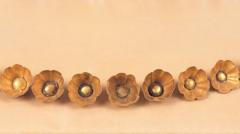The Sudan National Museum, once home to invaluable artifacts reflecting the rich history of Nubian civilization, has been severely impacted by war, leading to widespread looting and damage. Efforts are underway to reclaim what remains, but the path to restoration looks bleak amidst ongoing conflict.
Artifacts of History Lost: The Cost of War on Sudan's National Museum

Artifacts of History Lost: The Cost of War on Sudan's National Museum
Two years of conflict in Sudan have resulted in the devastating loss of cultural heritage and identity, transforming a symbol of national pride into a site of destruction.
Amidst the ravages of war that have engulfed Sudan for the past two years, the Sudan National Museum stands as a poignant reminder of the devastation that extends beyond physical infrastructure to the heart of the nation’s cultural heritage. Once a beacon of national pride, housing artifacts from the ancient Nubian civilizations and Christian artworks, the museum is now marred by destruction and loss.
Following the military’s assertion of control over Khartoum after battling the Rapid Support Forces (RSF), accounts of widespread looting and destruction have surfaced. Ikhlas Abdel Latif Ahmed, director of museums at Sudan's National Corporation for Antiquities and Museums, lamented the destruction of “our identity, and our history” as officials revealed that tens of thousands of artifacts have vanished or been sold during the RSF's previous control.
The museum, strategically located at the confluence of the Blue and White Nile rivers, served as a cultural hub where children marveled at their heritage, and visitors explored the storied past of Sudan. Alas, this narrative has transformed into one of bleak inspections and shattered remnants, with museum representatives reporting looted treasures alongside bullet casings and damaged exhibits.
According to Ahmed, the RSF militia has not only stolen unique artifacts but has also inflicted irreparable damage to others. Looting incidents have affected museums nationwide, prompting UNESCO to issue warnings about the cultural threat in Sudan. Amidst these challenges, the museum had been undergoing renovation, which inadvertently facilitated the theft of many precious items.
Reports implicate the RSF in illicitly transporting stolen artifacts to the United Arab Emirates (UAE), although definitive evidence remains elusive. Allegations suggested a profitable exchange for gold, further clouding the question of what has become of legendary pieces such as a 5th Century BC gold collar from King Talakhamani's pyramid.
As for recovery efforts, the Sudanese government plans to engage Interpol and UNESCO, yet the task seems daunting amidst continued instability. Observers have voiced concerns over the RSF’s actions, interpreting the attacks on cultural institutions as a strategic aim to obliterate Sudan’s historical identity for profit.
The consequences extend far beyond the loss of objects; nearly 13 million Sudanese have been displaced since the onset of conflict, with reports estimating approximately 150,000 casualties. Ahmed poignantly states, “The war is against the people of Sudan,” highlighting the harrowing human cost alongside the cultural obliteration.
Commitment remains as Ahmed joins a collective of advocates aiming to restore the National Museum and reclaim its treasures. With a resilient spirit, she declares, “Inshallah [God willing], we will get all our collections back. And we build it more beautiful than before,” embodying the hope for a future where history may once again flourish in the heart of Khartoum.



















